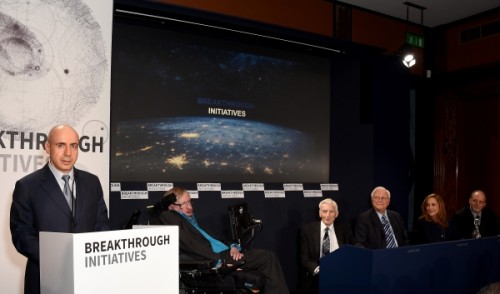
Alien hunters: Yuri Milner (left) and friends announce the Breakthrough Initiatives. (Courtesy: Breakthrough Initiatives)
By Hamish Johnston
Earlier this week in London the billionaire physics enthusiast Yuri Milner joined forces with some of the biggest names in astronomy and astrophysics to announce a $100m initiative to search for signs of intelligent life on planets other than Earth. The money will be used to buy time on a number of telescopes to search for radio and optical signals created by alien civilizations.
Called Breakthrough Listen, the project will survey one million of the closest stars to Earth and will also scan the centre of our galaxy and the entire galactic plane. Beyond the Milky Way, the telescope will also scrutinize the 100 closest galaxies for intelligent life.
Searching for intelligent life is one thing, but what if we actually find something? A related initiative called Breakthrough Message involves a $1m competition to compose a message to other worlds that could be broadcast from Earth. However, there is a very important caveat: “This initiative is not a commitment to send messages. It’s a way to learn about the potential languages of interstellar communication and to spur global discussion on the ethical and philosophical issues surrounding communication with intelligent life beyond Earth.”
This is a nice way of saying maybe we shouldn’t advertise our existence to extraterrestrial beings because they may be hostile. Indeed, the history of colonization here on Earth tells us that when folks with superior technology turn up on your shores, things usually don’t go well.
Life on other planets is also front-and-centre here on physicsworld.com, where we have just published a podcast interview with exoplanet expert Sara Seager of the Massachusetts Institute of Technology. Seager explains why astronomers are looking forward to using the next generation of telescopes, which should be capable of scanning the atmospheres of some exoplanets for signs of life.
Earlier this week I asked Seager what she thought of Milner’s initiative. “This is an astonishing level of funding seeming to come out of the blue from a single individual,” she said, adding “It’s time we all took more risks in science.”
If the aline life forms are more intelligent than us, can we safely say that they would be wiser than us?
1) If the intelligent form has taken more time to evolve than us, we can definitely say that they are wiser than us, because they would destroy themselves otherwise.
2) But, what if they have evolved into this highly intelligent form within a short amount of time?
However, the search for life beyond Earth is absolutely necessary for the expansion of our own scientific understanding of the Nature. Thanks for reading.
Thank you, Yuri!
This is an important question to address;
as is the fact that we have found NO evidence
of solar-system- or galaxy-scale engineering.
Sending messages seems low danger to me,
because any advanced civilization able to receive
a message from us, has already been watching us
for a long time, with space telescopes and probes.
what if they are giant cock roaches running out of food, by contacting them. They will know we have intellegence and that would mean rich in protein. and then they follow the signal back to earth and our pest control bills will increase exponentially…………….., good fences make good nieghbors, outer space is there for a reason.
(this is a joke, no one take this seriously, unless your a screenwriter for B movies)
in all seriousness, our schools are struggling, very bright children are not being recognized or educated. i think finding the intelligent life here would be a better use of 100m.
robotics, 3d printing will make cheap labor inconsequential , education is their only hope of survival